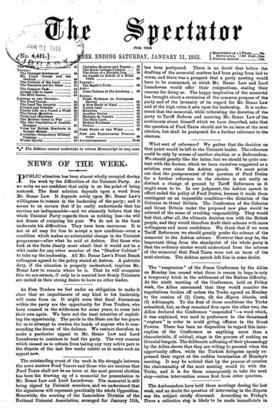What sort of reference ? We gather that the decision
on that point would be left to the Unionist leader. The reference could be only by means of another election or a Referendum. We should greatly like the latter, but we should be quite con- tent with the former, which we have ourselves suggested as a solution ever since the Ashton speech. We must point out that the postponement of the question of Food Duties for a further reference to the electors is not really so distinct a change of ground by Tariff Reformers as it might seem to be. In our judgment, the Ashton speech in effect ended the policy of Food Duties, because it made them contingent on an impossible condition—the dictation of the Colonies to Great Britain. The Conference of the Colonies and Great Britain under the proposed new plan would be relieved of the sense of crushing responsibility. They would feel that, after all, the ultimate decision was with the British people, and they would therefore draft their scheme with more willingness and more confidence. We think that if we were Tariff Reformers we should greatly prefer the scheme of the memorial to the Ashton scheme. However that may be, the important thing from the standpoint of the whole party is that the ordinary elector would understand from the scheme of the memorial that Food Taxes were not an issue of the next election. The Ashton speech left him in some doubt.










































